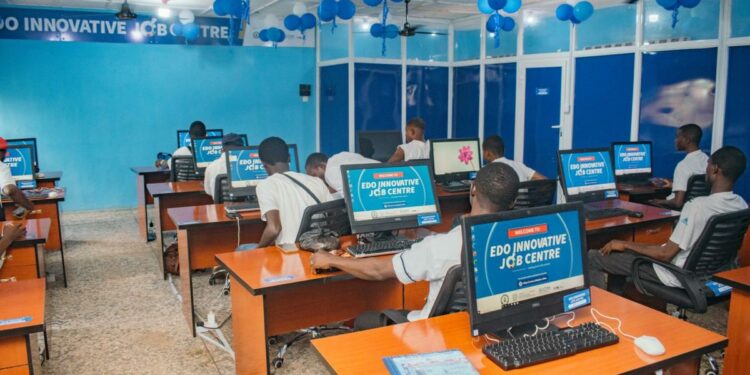The Edo State Government, through the Edo State Skills Development Agency (Edojobs) and the International Organization for Migration (IOM), has launched a revamped innovative jobs and skills centre at Evbuomodu in Ikpoba Okha local government area.
This was disclosed in a statement issued yesterday by the IOM, saying that the job centre, built in July 2000, is part of a network of seven structures established by the Edo State Government to boost youth employability by providing them with technical and vocational skills training, coaching, job matching, internships and employment opportunities.
With the support of the Government of Italy through the project “Managing Migration through Development (MMDP) 2.0”, IOM rehabilitated the centre, including the installation of a 5KVA solar electrification to provide 24 hours power supply, 17 computers, furniture and fittings for over 22 learning cubicles to expand its reach and increase the centre’s capacity to respond to the growing demand for employable skills coming from the community.
During the launch held on 11 October, IOM’s representative, Wintana Tarekegn, said, “Investing in human capital through the rehabilitation of education infrastructures is not just about creating opportunities for individuals; it is about laying the foundation for sustainable economic growth and social development.”
“IOM is thrilled to be part of this initiative to build a future where every young person has the chance to thrive and contribute to the prosperity of our communities”, he added.
As part of effective ways to address youth unemployment and issues related to irregular migration that have plagued Edo State for the past years, IOM is strengthening and establishing skills acquisition and job creation structures in partnership with the state as well as local governments.
Since 2022, IOM has been implementing the Managing Migration through Development (MMDP) 2.0 project by collaborating with state and non–state actors to contribute to the Edo State government’s efforts to prevent human trafficking and protect vulnerable migrants and community members.
Since its launch, the project has helped more than 300 young Nigerians acquire livelihood skills and set-up small businesses to become socio-economically independent with consideration and inclusion of persons with disabilities, the statement said.



